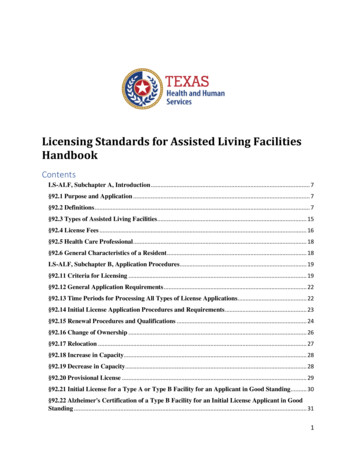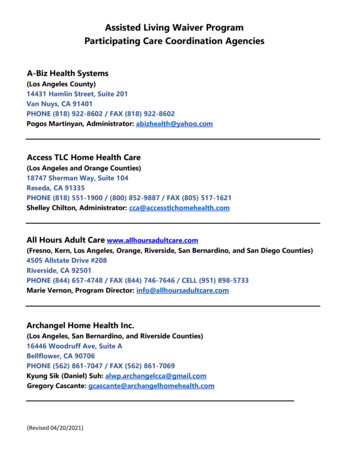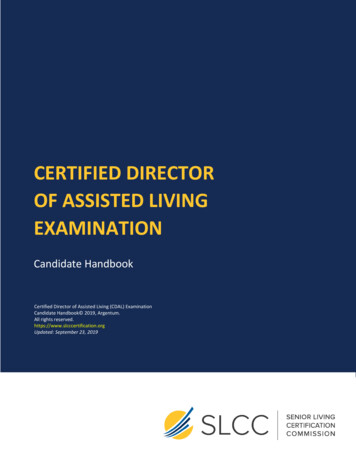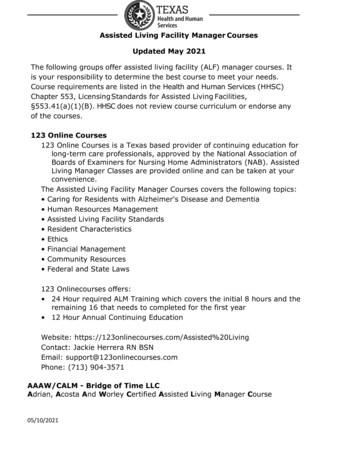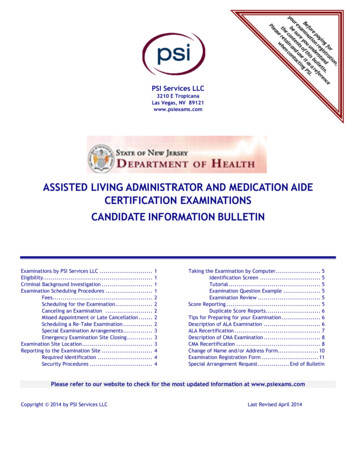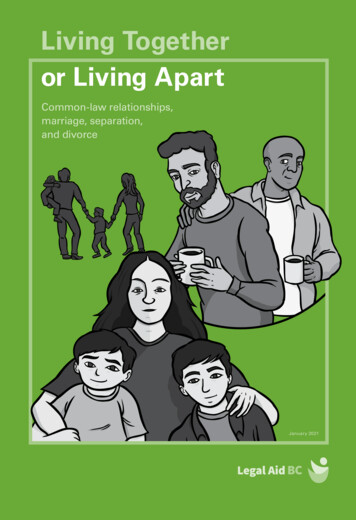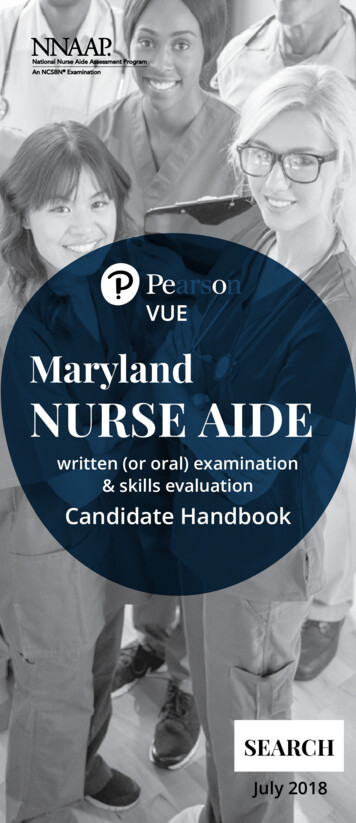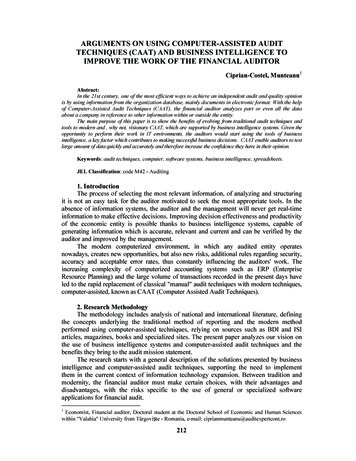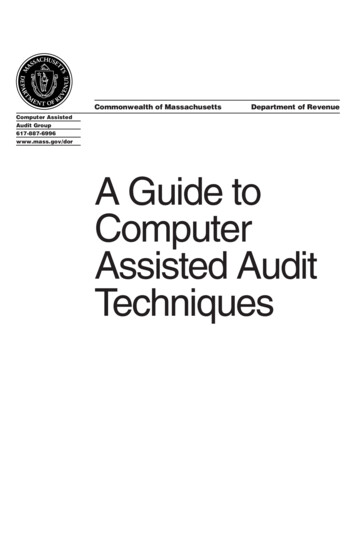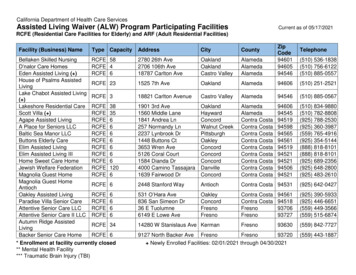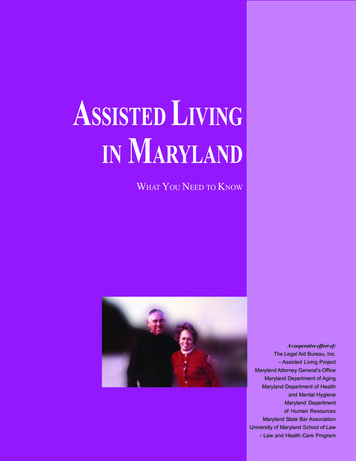
Transcription
ASSISTED LIVINGIN MARYLANDWHAT YOU NEED TO KNOWA cooperative effort of:The Legal Aid Bureau, Inc.- Assisted Living ProjectMaryland Attorney General’s OfficeMaryland Department of AgingMaryland Department of Healthand Mental HygieneMaryland Departmentof Human ResourcesMaryland State Bar AssociationUniversity of Maryland School of Law- Law and Health Care Program
ASSISTED LIVING IN MARYLAND:WHAT YOU NEED TO KNOWA cooperative effort of:The Legal Aid Bureau, Inc.- Assisted Living ProjectMaryland Attorney General’s OfficeMaryland Department of AgingMaryland Department of Health and Mental HygieneMaryland Department of Human ResourcesMaryland State Bar AssociationUniversity of Maryland School of Law- Law and Health Care ProgramAssisted Living in Maryland: What You Need to Know - 3
Copyright 2002University of Maryland School of Law4 - Assisted Living in Maryland: What You Need to Know
TABLE OF CONTENTSChapter 1An Introduction to Assisted Living . 3Chapter 2Choosing an Assisted Living Provider . 11Chapter 3What Will It Cost and How to Pay for AssistedLiving Services . 21Chapter 4Before You Sign a Contract . . . Read This . 27Chapter 5Your Rights Under the Law . 33Chapter 6How to Complain When Quality of Care IsLacking . 37Chapter 7Enabling Others to Make Health Care and FinancialDecisions for You . 39Chapter 8Alternatives to Assisted Living . 47Chapter 9Where to Get Help . 53Assisted Living in Maryland: What You Need to Know - 5
ASSISTED LIVING IN MARYLAND:WHAT YOU NEED TO KNOWCOMMITTEE MEMBERSJoan L. O’Sullivan, Committee ChairWilliam DorrillUniversity of Maryland School of LawOffice of Health Care Quality515 W. Lombard StreetDepartment of Health and Mental HygieneBaltimore, MD 21201Spring Grove HospitalBland Bryant BuildingDenise Adams55 Wade AvenueSenior Assisted Living Program ManagerCatonsville, MD 21228Maryland Department of Aging301 W. Preston Street, Room 1007April SeitzBaltimore, MD 21201Department of Human Resources311 W. Saratoga Street, Room 259Baltimore, MD 21201Elizabeth BinckesDepartment of Health and Human ServicesAging and Disability ServicesKevin Simpson410 Hungerford Drive, 3 floorOffice of the Attorney GeneralRockville, MD 20850Health Education and Advocacy Unitrd200 St. Paul PlaceRachel CohenBaltimore, MD 21202-2022Assistant Attorney GeneralMaryland State Retirement & Pension SystemSusan Shubin120 E. Baltimore StreetChief AttorneyBaltimore, MD 21202Nursing Home and Assisted Living Program29 W. Susquehanna AvenueStephanie EdelsteinTowson, MD 21204ABA Commission on Legal Problems of theTamara Z. CatchpoleElderly740 15 Street NWAssistant Attorney GeneralWashington, DC 20005-1022Maryland Department of Agingth301 W. Preston Street, Room 1007Morris Klein, Esq.Baltimore, MD 212014550 Montgomery Avenue, Suite 601NBethesda, MD 208146 - Assisted Living in Maryland: What You Need to Know
CHAPTER 1AN INTRODUCTIONTO ASSISTED LIVINGIf any of the following scenarios seemfamiliar to you, assisted living may bean option to explore. Your arthritisprevents you from cooking, and somedays it is so bad that you cannot evenfeed or bathe yourself. You cannot keepyour medications straight even with thepill reminder system your daughterbought you. Or perhaps youcannot get around anymore onyour own, even with a walker,and there is no family aroundto help you regularly. In short,it is getting harder to manageon your own, and you, yourfriends, or your family arebeginning to worry.Deciding whether assisted livingis the best solution for you is noteasy. To arrive at the best answer youshould:1. Read the rest of this booklet;2. Explore options other than assistedliving;3. Think about your abilities, yourneeds, and your finances; and4. Visit some assisted living facilities.This booklet explains the role andfunction of assisted living providers,but does not take the place of applicablelaws and regulations. It also discussesother options available, legal protections for residents, and area resourceswhere you can get more information. Inaddition, there are tips to assist you inthe following areas: deciding if assistedliving is for you, electing an assistedliving provider, entering into acontract for care, and paying forcare.What Is Assisted Living?Assisted living is a way toprovide care to people who arehaving difficulty living independently, but do not need thedaily nursing services providedin a nursing home. Assistedliving providers furnish a place to live,meals, and assistance with daily activities, such as dressing, bathing, eating,and managing medications. Peoplewho live in assisted living facilitiesgenerally have less complicated medicalproblems than people in nursing homes.Assisted living facilities also tend tohave a less institutional look thannursing homes. However, these facilities are not as highly regulated by thegovernment as nursing homes.Assisted Living in Maryland: What You Need to Know - 7
In Maryland, an assisted living provider is defined as:A residential or facility-based provider that provideshousing and supportive services, supervision, personalized assistance, health-related services, or a combination of these services to meet the needs of residentswho are unable to perform, or who need assistance inperforming, the activities of daily living or instrumental activities of daily living, in a way that promotesoptimum dignity and independence for the residents.If a person is mentallysharp, only takes medication for arthritis pain, andonly needs assistance withdressing and bathing he orshe would be classified asneeding a low level ofcare. A person would needa high level of care if he orshe is mentally confusedby dementia, has a complicated list of powerfulmedicines that must be givenat different times each day,Code of Maryland Regulations 10.07.14.02B(10).There is a wide variety of assisted livingproviders in Maryland. They range fromlarge, corporate-managed facilities wherehundreds of people live in their ownapartments to small, private homes inwhich the owners provide services to tworesidents who may share a bedroom.What all of these providers have in common, however, is they all offer theirresidents some level of assistance withtheir daily activities, like dressing, bathingand eating.Levels of CareAssisted living facilities in Marylandare licensed to provide up to threelevels of care.The levels correspond with how muchassistance residents need. Licensure atlevel one means the provider is authorized to take care of residents with lowcare needs. A level two license meansthe provider can also take care ofresidents with moderate care needs, anda level three license allows a providerto care for residents with high-levelcare needs (as well as residents withlow or moderate needs).WAYS IN WHICH ASSISTEDLIVING PROVIDERS DIFFER: Facility size;Staff qualifications;Location;Fees, what is included in the monthlyfee varies widely;Sponsorship: non-profit vs. for profitvs. religious affiliation;Free standing facility vs. a campustype setting;Experience and reputation of provider;Private room vs. semi-private room;Private bathroom vs. common bathroom;Provider participation in MedicalAssistance;Ability to age in place: levels of care,potential for level of carewaivers;Visiting hours; bedtimes; wake-uptimes; mealtimes.8 - Assisted Living in Maryland: What You Need to Know
and requires assistance with bathing,eating, walking, dressing, and toileting.Such a person could only be accepted bya provider with a level threelicense.Most providers are licensed atlevel three, which means theycan accept residents with low,moderate, or high care needs.If you have a progressivecondition and do not want tohave to move repeatedly, youshould look for a providerwith a level three licenseeven if you only need a lowlevel of care now.Assessment and Service PlanBefore you move into an assisted livingfacility, the assisted living managermust assess the level of care you requireand whether you qualify for admissionunder the provider's license. Forexample, if you need a moderate orhigh level of care and the provider isonly licensed to provide a low level ofcare, the provider will not be able toadmit you. There are two parts to anassessment: the Resident Assessmentand the Functional Assessment.Resident AssessmentA resident assessment is based on aphysical examination made by a medical professional. It records a lot ofbasic medical information.Functional AssessmentThe assisted living manager mustconduct a functional assessment. Afunctional assessment measuresand records various kinds ofinformation, such as yourability to take care of yourdaily needs and how muchhelp you need from others.It also records currentsymptoms you have thatwould have to be monitored by an assisted livingprovider. In addition toyour physical needs, thefunctional assessment alsolooks at things like your abilityand desire to participate in groupactivities.Service PlanThe manager must also develop a planfor your care based on the overallassessment. This plan is called the“service plan.” A service plan muststate what services you are to be provided, when they are to be provided,and who will provide them. You areentitled to participate in the development of your service plan. Moreover, aservice plan must be updated every sixmonths or more frequently, if there arechanges in your needs. Your serviceplan is very important because it specifies precisely what services you willget, when you will get them, and how.Each assisted living manager mustAssisted Living in Maryland: What You Need to Know - 9
make sure that every resident is monitoreddaily to see that a resident’s care isprovided in accordance with the serviceplan.Activities of Daily Living and OtherRequired ServicesActivities of Daily LivingA large part of what assisted livingproviders do is provide assistance with"activities of daily living,” whichinclude: Eating; Grooming, bathing, oral hygiene,shaving, and combing hair; Walking or getting around, with orwithout assistive devices; Toileting; and Dressing in clean, weather-appropriate clothing.Often this type of assistance is called“personal care” or “personal careservice.”Other services that assisted livingproviders in Maryland are required todeliver include:MealsMeals must be served in a commondining area three times a day seven daysa week. Snacks also must beoffered at intervals each day.While every assisted livingprovider must try to accommodate special diets, aprovider does not have toprovide a special diet that isbeyond its capabilities.Laundry and HousekeepingHousekeeping and laundry services arerequired services that must be offeredby every provider. Typically a certainamount of these services are covered bythe basic monthly fee. What thatamount is varies greatly from providerto provider.Facilitating Access to Healthcare andSocial ServicesWhile a few assisted living providersmay employ part time nurses, mostproviders do not supply the kind ofmedical care offered by licensed healthcare professionals. However, everyassisted living manager is “responsiblefor facilitating access to appropriatehealth care and social services,” such asphysicians, nurses, social workers,dentists, hospice care, etc. “Facilitating access” is a flexible phrase sodifferent providers implement thisrequirement in widely different ways.Some providers only provide help withscheduling appointments, and you willhave to arrange for your own transportation. Others will arrange appointments and provide transportation, whilesome providers go so far as to arrangefor services to be delivered at thefacility. You will want to ask providershow they facilitate access to health careand social services.10 - Assisted Living in Maryland: What You Need to Know
Social and Spiritual ActivitiesThe manager of each provider mustprovide or arrange opportunities foractivities that will promote the physicaland mental health of each resident.This includes facilitating access tospiritual and religious activities. Typically providers satisfy this requirementby conducting activities in the facilityand by arranging transportation toactivities outside the facility. Cardgames, bingo, and sing-alongs are thekind of activities you will find in manyfacilities. Typical activities outside afacility may include trips to the mall,grocery store, and local worship services. Transportation charges mayapply, and when they do, they can varywidely.Medication ManagementDuring the initial assessment processthe assisted living manager must determine if: (1) you can handle your ownmedications, (2) you need assistancewith your medications or reminders totake them, or (3) need someone toadminister your medications for you. Ifyou need assistancewith your medicationsor need someone toadminister them foryou, the provider musthave specially trainedstaff to supply that helpto you.Assisted Living in Maryland: What You Need to Know - 11
12 - Assisted Living in Maryland: What You Need to Know
CHAPTER 2CHOOSING AN ASSISTEDLIVING PROGRAMChoosing a high quality assisted livingprovider that meets your needs and yourlifestyle can be quite a challenge.Assisted living providers in Marylandrange in size from small, family-stylehomes with two people sharing abedroom, to large apartment complexeshousing several hundred residents. Theservices they offer can be just as varied. What types of living units areGetting StartedRequest a brochure, a price list, and acopy of the Resident Agreement (contract) so that you can review thoseitems before you visit. Do not rely onwhat the brochure says. Read thecontract closely, paying special attention to costs, services provided, anddischarge policies. Chapter 4contains detailed informationon what to look for in a Resident Agreement.To find out what facilities exist in thearea you are interested in, ask yourfriends and other acquaintances, checkwith your local agency on aging, andlook at newspapers, retirementliving guides and other publications. The resources listedin Chapter 9 will help. Ifpossible, try to choose afacility that is near yourfamily or friends.Once you have a generalidea of what setting, services, and pricerange you prefer, call several facilitiesin the location you are considering.Ask the manager or administrator thefollowing preliminary questions to helpyou narrow your search:available?If none, do you have a waiting list?What is your monthly fee?Do you require a deposit?What services do you provide?What services are included in themonthly fees? What services are extra? Also, request a copy of theassisted living provider's Disclosure Statement. This disclosure statement must include information aboutother facilities operated by the sameorganization, the organization's religious or charitable affiliations, thename of the manager, and a descriptionof special programs offered. There isno cost for this document. What is the size of your facility? What level of care are you licensedto provide?Assisted Living in Maryland: What You Need to Know - 13
Before you make any decisions, visit asVisits can be exhausting. After a whilemany facilities as you can. Take a tour,the different providers and their facilitiestalk to residents and tomay start to blendstaff, and ask a lot ofin your memory.WHEN YOU VISITquestions. Have aThe checklist onfriend or family mempages 14 - 19 will Ask the manager to showber go with you to behelp you organizeyou around the building andanother set of eyes andyour visit, ask thegrounds.ears. You can comright questions, and Consider the overall atmopare notes later.record your obsersphere of the facility.If you need helpvations. The Talk to members of the staff:selecting a facility, youchecklist is lengthyare they friendly and helpmay want to hire aso you must reviewful?geriatric care manager.it before you go Chat with residents, theirGeriatric care managersand highlight orfriends, and families.are professionals whomark the questions Observe how the staffspecialize in assessing athat are the mostinteracts with residents.person’s needs andimportant to you. Eat a meal. (There may be aarranging housing andMake as manycharge for the meal.)services to meet thosecopies of theneeds. See Chapter 9checklist as youfor the telephonelike. You shouldnumber of the National Association ofProfessional Geriatric Care Managers,DOCUMENTS TO GETwhich can refer you to a local care manager.AND READVisiting FacilitiesOnce you have decided which facilities tovisit, call to make an appointment. Try tovisit each facility more than once, to geta better sense of what life is like forresidents. Plan your first visit for a weekday, during late morning or at midday ifpossible, and another on a weekend or inthe evening. Make the second visitunannounced. Be concerned if theprovider will not allow you to make anunscheduled visit. You may even want toask about spending the night to get a senseof how the facility is run during off-peakhours.If you do not already have them by thetime you visit, be sure to get a copyof the: Resident Agreement (contract),List of services offered,Notice of resident's rights,List of costs,Disclosure statement, andAny other documents that residents must sign at admission.Carefully review these documentsand read Chapter 4 before signingany papers!14 - Assisted Living in Maryland: What You Need to Know
use one copy for each facility you visit.Use a notebook for additional informationand questions. The answers to thechecklist questions can be used to compare facilities once you have visited them.If you are not able to get all the questionsanswered during onevisit, visit again orcall on the telephoneto get the answers.whether the provider has received complaints, and how those complaints wereresolved. See Chapter 9 for the numberfor your local Long Term Care Ombudsman.You can also ask an assisted livingprovider you are considering for acopy of its most recent inspectionreport. The law requires providersto make copies available.Judging QualityYou will learn a greatdeal by visiting a facility, askingquestions, reviewing the Resident Agreement, and reviewing other written materials. But you will also want to consider thequality of the services and care provided.You can go to see or request copies ofinspection results and plans of correctionfrom the Office of Health Care Quality.(There may be a charge for copies and itmay take as long as 30 days to get them.)See Chapter 9 for the address. You willwant to find out: How recently was the providerinspected? Were any violations found? What were the violations? Have the problems been corrected?Remember to focus on the seriousness ofany violations, not just the number ofthem.Certain factors contribute to qualitycare. They include: Consistent and responsive ownership; Stable, well-trained staff; The number of residents per staff member;Interaction with the community;A provider philosophy that emphasizes residents’ dignity and individual needs;A mission to eliminate restraints, orto use them only when no individualized care plan works.Teamwork between managementand staff; andRespect and advocacy for residents'rights.Keep these factors in mind during yourvisits and while reviewing any inspection reports.Your local Long-Term Care OmbudsmanProgram may also have information abouta particular service provider, includingAssisted Living in Maryland: What You Need to Know - 15
Checklist for Selecting an AssistedLiving Facility1 What is the current amount of theThe complete checklist that follows isorganized into eleven sections: 1. Costs & Contracts2. Personal Care3. Health Care4. Transportation5. Activities & Socializing6. Meals7. Housekeeping & Laundry8. Safety/Choice9. Facility Initiated Discharge10. Licensure11. Special Care/Dementia Units. 1. Costs and Resident Agreement(Contract)The Resident Agreement is a legalcontract, obligating you to potentiallypay very large sums of money for care.Ideally, you will have gotten a copy ofthe Resident Agreement and reviewed itbefore you visit. Chapter 4 explainswhat to look for in a Resident Agreement.If you have not gotten a copy beforeyou visit, make sure you get a copy andduring the visit ask any of the followingquestions that are important to you.Later review the Resident Agreementcarefully with Chapter 4 in hand beforeyou agree to sign. Is the print large enough for you toread? (If not ask for a copy that is.) What services are provided for thebasic (usually monthly) fee? basic (usually monthly)fee?What services areavailable for an additional charge?What is the amount ofeach additionalcharge?Is there a refund policy incases of transfers, discharges,changes in ownership, or anassisted living facility closing?When will any refunds be paid?What behaviors, conditions, or othercircumstances can result in terminationof services?What type of living unit will I have?What are the rights of residents?What is the provider’s grievanceprocedure; and what alternatives arethere if I am not satisfied with theresults of the procedure?What, if any, initial payments arerequired?If any are required, how much arethey and what are they for?What happens if my funds run out?What is the provider’s policy onrelocating residents in the facility?If I am away from the facility for aperiod of time, (e.g., visiting family, ina hospital, or temporarily in a nursinghome) what fees stop?Is there a charge to hold a bed duringan absence?If there is a charge, when does itbegin?How long will you hold a bed for me?When, how often, and why can thefees be changed?When fees are changed, who isinformed, and how?16 - Assisted Living in Maryland: What You Need to Know
How much advance warning is pro-vided of fee changes?2 Does the providerparticipate in theMedicaid waiverprogram?accessible to people with walkers orwheelchairs? If rooms are shared, what does theprovider do if there are problemsbetween roommates?Written Service Plan2. Personal CareTake into considerationthat you may need morecare in the future than you need now. Ifyou do not want to move again, askquestions about care that you do notneed now, but may in the future. In anyevent, you will want to ask the questions below.Meeting Individual Needs How often will my level of care bereassessed? How many residents are you licensed to serve? What level of care are you licensedto provide? How will the provider meet mycurrent care needs (e.g., incontinence, insulin shots, etc.)? What happens if my needs change I need more help, become incontinent, become confused? How does the provider tailor schedules for preferences of residents(like bathing and waking times)? How does the provider help residents maintain their abilities totoilet, dress, and eat? Is there a schedule for staff to checkon each resident's whereabouts andwell being? What resources does the providerhave to address difficult behavior? Are bedrooms, hallways, doorways,bathrooms, and common areas fully What professionals/staff will be involved in the development of mywritten service plan?How often is the plan revised?How will my family and I be involved?What involvement does a confusedresident have?What happens if I do not agree withthe service plan?Staffing How many staff are there for eachshift? What are their responsibilities? What is the training/certification ofthe people who care for residents? What other duties do direct carestaff have? Which direct care staff on each shiftis fluent in my native language? Is there special training for staffabout dementia and Alzheimer'sdisease? How is staff trained to deal withaggressive individuals? How is staff trained to deal withwanderers? What if I do not like the staff personassigned to me? What is the staff turnover rate?3. Health CareWhile most assisted living providers arenot designed to provide medical care, aAssisted Living in Maryland: What You Need to Know - 17
provider must make sure residents haveaccess to health care either on or offsite. It is important to evaluate theprovider’s capacity to manage or coordinate health care needs because youmay need more help in the future.Provision and Monitoring of HealthCare What kinds of health monitoringchecks are available (e.g. weightchange, glucose levels, etc.)? If a nurse is not on staff, are thereregularly scheduled visits by a nurseor other health provider? If so, what medical services do theyprovide? How will the provider facilitate myaccess to health care and socialservices? Will the provider schedule routinemedical appointments for me? Will the provider schedule transportation to and from medical appointments? What health services are availableon site: e.g. nursing care, lab work,physical therapy, wound care,hospice, social work, podiatrist,etc.? What health services does theprovider furnish, and what does itarrange for outside agencies toprovide? Under what circumstances and when willthe provider call myfamily? Under what circumstances and when willthe provider call my doctor?Medication Management What safeguards are in place toensure that I get the appropriatemedications on time and in the correctdosage? Who is responsible for having prescriptions filled? Must I use the provider’s pharmacy,even if it costs more than my pharmacy? Who gives out medications? If not a nurse, how are staff trainedand supervised about medications? If I am able, will I be allowed to takecare of my medications on my own?4. TransportationQuestions to ask about transportationinclude the following: Is any trans- portationprovided?If so, how often(daily, weekly,evenings, weekends)?To where is transportation provided(grocery stores, shopping malls,medical appointments)?Will the provider call and arrange fortransportation it does not provide?Is transportation available if I want togo to an event by myself or with afriend?Are there fees for using the provider’stransportation or transportationarranged by the provider?Is transportation wheelchair accessible?18 - Assisted Living in Maryland: What You Need to Know
5. Activities and SocializingWhen looking at theactivities a facility offers,think about your preferences. Some people enjoyscheduled activities, such ascurrent events discussions, crafts, bingo,card games, etc. Others have never been“activities people” and will not care toparticipate. They would rather read abook. You may want to go on trips andoutings. Look at a monthly activityschedule to see if the activities appeal toyou. Inquire about the following: How often are activities in the community scheduled?Will staff attend withme?Are there protectedor enclosed walkingareas for residents?How are resident’sreligious or spiritualneeds met?Who develops and supervises recreational activities?How do residents have input intothe activities offered?What is the provider’s policy onpets?What is the policy on visitors?6. MealsMeals are important to residents ofassisted living because they are usuallydependent on the food provided by theprovider. So sample a meal on yourvisit to see how it tastes. Questions toask include the following: What times are meals served? What happens if I am late, miss ameal, or refuse a meal? How will any special dietary needs I have be met?When can I have a tray delivered tomy room?Is there an additional charge for trayservice?If I do not like a meal, what are thealternatives?When are snacks available?May I see the printed menu for thepast month?How do you make sure each resident is taking in adequate nutrition?7. Housekeeping and Laundry How often will my room becleaned? How often will my linens bechanged? Will the provider do my personallaundry? Are washing machines available forme to use at the facility? If so, is there any cost to use them? What extra charges, if any, are therefor additional housekeeping orlaundry services?8. Safety and ChoiceAssisted living providers should emphasize independence and choice. Theyalso have rules and procedures designedto protect residents from harm. It isimportant to match your ability with theextent of choices and opportunitiesoffered by a provider, as well as thelimitations it will impose upon you.Assisted Living in Maryland: What You Need to Know - 19
Questions to ask include:Safety What safety measures are in place toprotect resident's personal propertyfrom being stolen? What safety measures are in place toprotect residents from wanderingaway? Are exit doors alarmed? Are there call bells in each room andbathroom? Are the floor coverings made ofnonskid material? Is there a fire emergency plan? What are the safety arrangements forpeople in wheelchairs to escape incase of fire? How often are there fire drills? How do residents with limited mobilityparticipate in fire drills? Are emergency plans publicly displayed?Emergencies What kind of emergencies are staffexpected to handleand how are theytrained for them? Who decides whether to call911? May I have a copy of any writtenpolicies about how that decision ismade? Will my family be notified immediatelyif 911 is called?Choice How much of my own furniture andpersonal possessions may I bring? What if I want an exception to apolicy, e.g. signing in and out, smoking, or eating foods that are not on aprescribed diet? What is theprovider’s policy onsmoking? Will the providerrequire that I participate in any particular activity orprogram?9. Facility Initiated DischargesAnswers to these questions will help youclarify a provider’s ability to care forpeople with hea
Resident Assessment . A resident assessment is based on a physical examination made by a medi-cal professional. It records a lot of basic medical information. The assisted living manager must . conduct a functional assessment. A . Assisted Living in Maryland Handbook .File Size: 1MB
